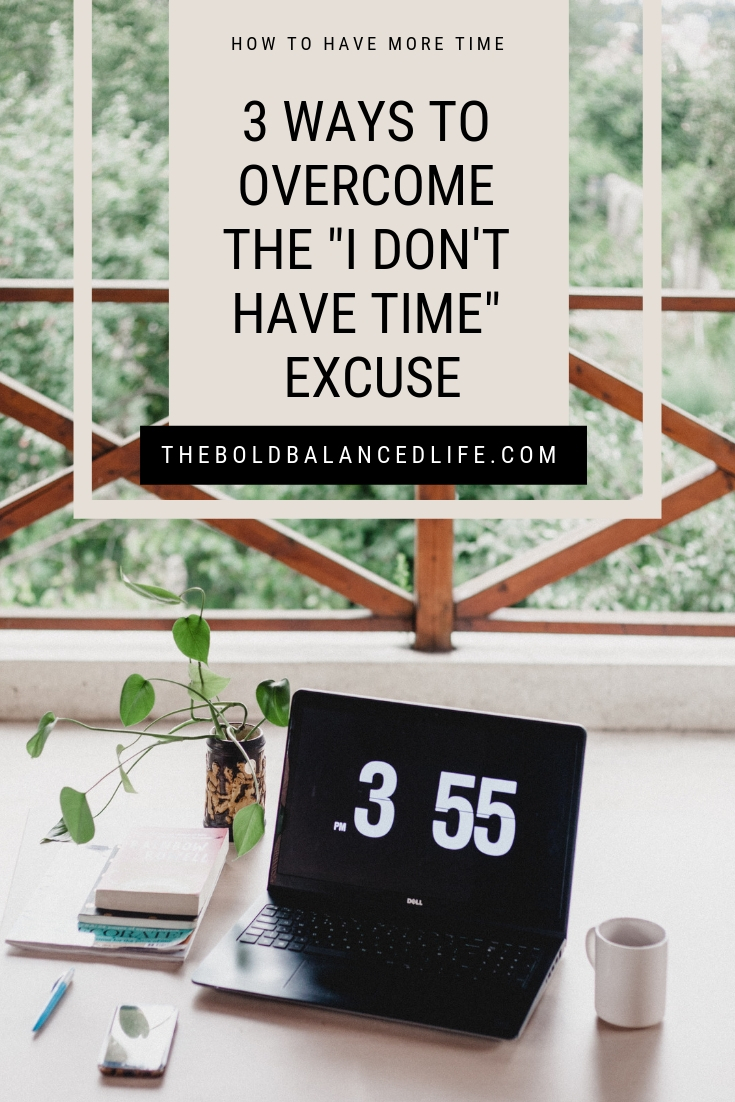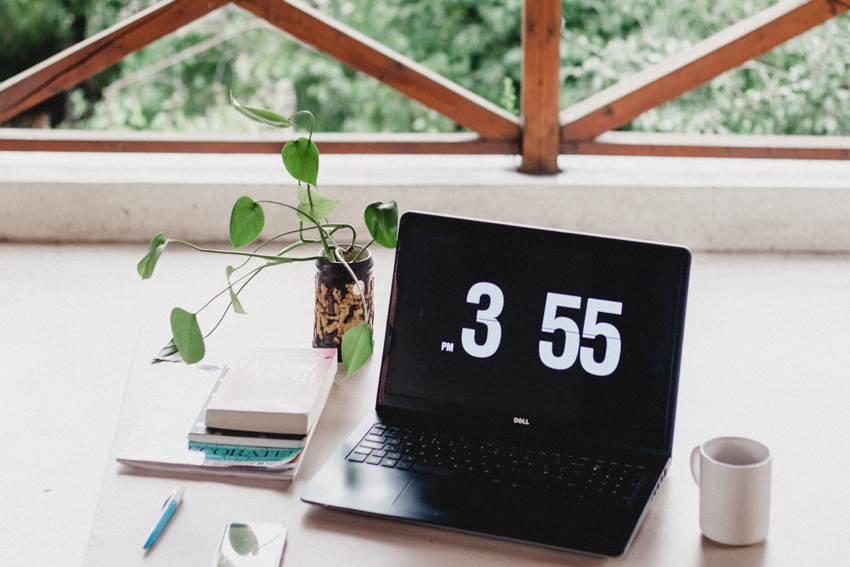How often do you think to yourself, “Why are there never enough hours in a day?” And how about, “If only I had more time, I’d __________(fill in the blank)?” The “I don’t have time” excuse seems to be everyone’s favorite explanation for what’s standing between them and achieving their goals or fulfilling their dreams. I get it. I’ve used that excuse more times than I’d like to admit. So what can we do to overcome this limiting belief? Here’s how to have more time for the things that truly matter to us:
Time yourself
To know exactly how much time you have and what you’re spending it on, time yourself for an entire day. (Or week, depending on how regular your days are). Take note when you start and end an activity and write it down in a weekly planner. Yes, it’s tedious, but you’ll see exactly where your time goes. And where there’s room for working toward your goals.
I timed myself during a particularly difficult time in my life, and the result was daunting. I had hardly more than an hour a day during which I could do as I pleased. But you know what, I didn’t use that time well, either. You might think, “Why bother? An hour a day is not enough to achieve your goals.” The reality is that, yes, it might take a while to hit milestones or see any real improvements. But the truth is: an hour a day is still better than not working on your goals or dreams at all.
Chances are, though, that you have more time than you think. Which brings me to my next point:
Set priorities
How much of your time do you spend on shopping, social media, watching TV, or reading novels? As much fun as those things are, can you reduce the amount of time you spend on them and instead use it to work toward your goals? Figure out what matters most to you and allocate your time accordingly. It’s okay if you spend time on the above-mentioned activities. Just ask yourself if you really do them because they are fun and relaxing or because you’re scared of taking action toward what you really want?
Another important aspect of setting priorities is that your to-do list isn’t a mile long. I fall into that trap all the time. My mind comes up with so many ideas and things I want to try and learn. I look at my to-do list and think, “This is going to take forever. It’s too complicated. I don’t even know where to start.” So I’m tempted to not start at all. And that’s exactly what happened today when I took a short break for my weekly accountability date with my sister. We were talking about our goals for the upcoming week and she had to remind me
how NOT to write a to-do list
(because mine looked something like this)
- Learn SEO
- Master Pinterest
- Come up with a strategy for Goodreads
- Meal prep
- Stretch more
- Write two more articles

Fortunately, at this point, I know that I’m blocking myself by writing a to-do list like this. There’s no possible way to accomplish all of these things today and possibly not even this week. It makes me mad that I can’t be superwoman and knock these out in a day. So I allow myself to be mad for a few minutes, and then I sit down and write a more realistic list.
How to write a to-do list that actually works
- Watch a 15-minute SEO video tutorial to get an overview
- Create a Pinterest graphic for this article
- Update my Goodreads profile picture
- Make overnight oats
- Set a reminder for 9pm to stretch for 5 minutes
- Finish this article
Generally, three to five action items are enough and they should be specific tasks you can actually accomplish in a day.
Streamline your routines
Now that you know how much time you spend on your daily tasks, let’s look at ways to reduce the amount of time you spend on the things we all have to do as adults. Things like tidying, cleaning, cooking, getting ready, laundry, and shopping for groceries. Here are a few suggestions to get you started:
Organize your home and your workspace
Seriously, take 15-minutes a day to declutter your environment. Not only will this leave you with a space that is conducive to focusing and relaxing, but it will also drastically reduce the amount of time you have to spend on tidying and cleaning. I find this point so important that I just became a certified organizational specialist so I can help and teach others how to get organized.
Need more guidance? Sign up for the Learn to Organize Like A Pro Workshop here.
Prepare for your morning the night before
Getting out of the house on time is always hardest on days like today. My toddler was awake coughing for two hours during the night and the house was freezing in the morning because we’re approaching a colder season. If I hadn’t prepared breakfast and my little one’s lunch the night before, as well as having a warm sweater and socks next to my bed, this morning would have gone a lot differently. Since I’ve cut down on the clothes we own, there’s no need to plan our outfits for the next day. But if you feel like it takes you forever to choose what to wear in the morning, then picking out your outfit the night before will save you time.
Meal plan and meal prep
This is still a work in progress for me, but I’ve gotten quite good at meal prepping breakfast (hello, overnight oats) as well as prepping certain ingredients. If you’d like an example, I’ve used the Buddha Bowls meal prep plan from Sweet Potato Soul and the 9 ingredients prep from Downshiftology as inspiration. My aim is to spend a maximum of 15 minutes on putting together a nourishing meal, which is a challenge because I cook 80 percent of our meals from scratch.
Meal planning also makes grocery shopping less time-consuming. You’ll need to shop less frequently and you won’t have to run to the store to get that one ingredient you forgot or just ran out of. I also order pretty much all of our groceries online and have them delivered to my doorstep (we use both Google Shopping Express and Amazon Prime Now). No more trying to buy groceries for the week with a curious, strong-willed toddler who can’t sit still. (Bye bye, nightmare).
Set timers and reminders
Both are helpful tools to get stuff done, and I wouldn’t be anywhere near as productive or focused without them. Here are a few timers and reminders I use throughout the day:
- a 15-minute timer for writing my morning pages, because otherwise I’d easily spend an hour on them instead of writing content that could pay my bills. You can do the same for activities where you easily lose track of time, such as TV or social media.
- a reminder to take a few minutes (2-10 minutes) each day to practice mindfulness or meditate. The Calm app is my favorite (I love Tamara Levitt‘s voice).
- a bedtime reminder for 9:45pm to start my relaxing nighttime routine. Admittedly, this is the hardest for me to follow, because despite our best efforts, our kid’s current sleep time isn’t as predictable as we wish it were. Some days it works well, other days everything gets pushed back so I have little or no time to work on my goals. Have a plan, but stay flexible, otherwise you’ll drive yourself mad.
Lastly, show yourself some compassion. The reason why time management so often fails is because we have unrealistic expectations. There’s a limit to what we can achieve in a day and that’s something we’ll have to remind ourselves of when we try to increase our productivity. Playing the comparison game is the worst thing you can do, because we all don’t share the same circumstances. There’s no such thing as “one size fits all” and you’ll just end up feeling inadequate and frustrated if you keep comparing yourself to people who are not in the same situation as you.
Whether you want to learn a new skill, write a book, take some time for self-care or spend more quality time with your loved ones, the next time the “I don’t have time” excuse pops up in your head, try some of the things I’ve mentioned above and see that you actually do have some time for the things that truly matter to you.
Recommendations
- 5 side-hustle essentials for stressed parents with no time/energy by Craig Phillips
Image: Georgia de Lotz







